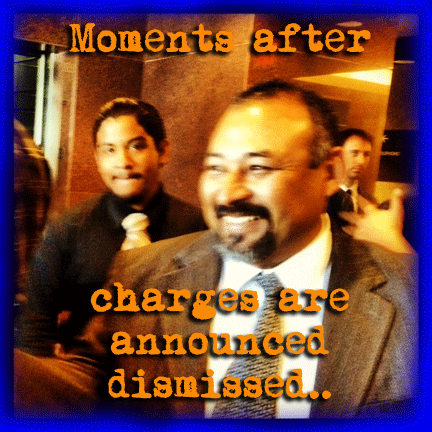THE DISMISSAL
Wednesday morning, Judge Dale Fischer of the United States District Court for the Central District of California said that she was granting the motion made by federal prosecutors to dismiss all charges against nationally known gang intervention leader, Alex Sanchez.
Actually what Judge Fischer really said was that she’d already dismissed the Sanchez case last Friday, a fact of which all of those assembled in Fischer’s courtroom on the 8th floor of the Edward R. Roybal Federal Building, seemed startlingly unaware.
“You didn’t see it?” she asked Sanchez’s court appointed attorney, Amy Jacks, who shook her head, looking confused. Arguing the finer points of the government’s proposed dismissal was, after all, the whole reason that Jacks and Sanchez were in the courtroom on Wednesday. Seeing Jacks’ confusion, the normally in-control judge turned next to the prosecutors who stared back at her, equally perplexed. It took some minutes of sorting to determine that, after the judge had entered the dismissal order last Friday, the thing had somehow managed to get stuck somewhere in the bowels of system thus, until this minute, no one else had any way of knowing that she’d actually ruled.
Once the procedural knots got untied, the judge hastily added that she was “exonerating” Sanchez’s bail-–the $2 million bond that friends and family had put up, half in real estate, half in sureties— since Sanchez himself owned no property, and had no real savings.
And, so it was rather anticlimactically that, after three-and-a-half years of fighting federal racketeering (RICO) and conspiracy to commit murder charges …. Alex Sanchez was free.
Well, mostly free.
Specifically, Judge Fischer granted the government its motion to dismiss the case “without prejudice,” which means that the federal prosecutors led by U.S. Attorney Garth Hire, could refile the case within six months, although Judge Fisher cautioned Hire not to take that long.
“You need to make up your mind relatively quickly,” she told him crisply then, with a nod toward Jacks, “The government is paying for counsel.”
Amy Jacks is Sanchez’s second court appointed attorney. The case has dragged on so long that Sanchez’s first attorney, Kerry Bensinger, has moved up the legal ladder to be appointed by Jerry Brown as a Superior Court Judge. The government is on its second team too. All of the original prosecutors who first filed this tragic mess of a case have been replaced.
Hire assured the judge that he would figure things out one way or the other by the end of March, after his team has had a chance to go through the piles of material amassed by the previous prosecutors. (That would be the group that put together the case that has just been dismissed.)
Fischer snapped that she hoped that any future filing would “be done much more carefully than it was last time.”
Hire, who had already admitted that he sought the dismissal because the case against Alex was “flawed,” made assurances to the effect that, yes, any future filings—should there be one— would be based on “proof we intend to take to trial.”
THE CASE
The case against Alex Sanchez, in brief, was as follows: On June 24, 2009, Sanchez— then 38-years-old, married, the father of three, and a former gang member who transformed his life to become nationally known for helping kids find a way out of the gang world, and helping heal communities lacerated by gang violence—was arrested and charged, along with two dozen other defendants, with a laundry list of crimes having to do with the alleged activities of a local clique of the Mara Salvatrucha (“MS-13″).
The charges that were specifically attributed to Sanchez, whom the feds characterized as living a double life as the clique’s shot-caller, all centered around four wire-tapped phone calls, during which he was supposed to have ordered the murder of Walter “Camaron” Lacinos, who was, indeed, subsequently murdered in El Salvador, allegedly by a person nicknamed, “Zombie”, whom the feds said was on the primary phone call.
Except he wasn’t. The prosecution’s expert witness completely misidentified the most crucial participant on the supposedly damning call, who turned out to be—provably— an inactive gang member also nicknamed “Zombie” who was no where near any murders and who, when interviewed, along with his sister, was able to blow a great big hole in the center out of the prosecution’s theory. Added to that, the important parts of the phone conversation were reportedly disasterously mistranslated and/or misinterpreted from the highly colloquial Spanish the men were speaking. And still another part of the conversation, which forcefully contradicted the prosecutors’ contentions that Sanchez was an active gang member and a shot caller, was handily left out of the transcript altogether. Really. The expert witness and the feds, just left out the part they didn’t like.
Plus it seems that the El Salvadorian police have an entirely different theory of the Lacinos murder, which appears more plausible and, well, fact-based.
The boggling list of case-shredding problems goes on from there.
As prosecutor Hire admitted with grand understatement, the government’s case is “flawed.’
In her own motion to dismiss the case, Sanchez’s attorney put it another way. Jacks wrote that the first team of government prosecutors
“….presented false evidence to the grand jury issuing the indictment; that a government prosecutor lied to the grand jury in subsequent proceedings; that the government failed, for more than three (3) years, to take any action to formally acknowledge or attempt to correct an indictment based on false evidence; and that government prosecutors withheld from Mr. Sanchez favorable and exculpatory evidence.”
Ms. Jacks noted Wednesday that while the new government prosecutors had not admitted to her allegations, nor had they refuted them.
This does not guarantee an outcome when it comes to the refiling question, but it says a great deal. Garth Hire and the other members of the new prosecutorial team, honestly, on first bounce, seem like sane, logic-driven professionals. The earlier team members appeared to be something else altogether, people intent on winning, whatever the cost. Seeking justice wasn’t even on the table.
Even experienced criminal court watchers I spoke with came out of those early hearings shaken.
THE COST
So what are the costs to a man and his family of 3 1/2 years of what sure appears to be a wrongful murder charge?
After the hearing, Sanchez and around two dozen friends and family members held a press conference outside the Roybal Building, where he explained just a little bit of what these years of being under indictment for murder had been like for him, for his kids, for his family. He talked about how he’s going to start rebuilding, but that admittedly a lot has been lost.
Privately Sanchez talked about some of those losses—some of them obvious, like the dive in funding dollars for Homies Unidos, the gang intervention non-profit he founded. And then there are the things you wouldn’t think of, like for example, how when one of his brothers was dying of cancer last year, he wanted help him keep his business afloat by doing some of the work himself, but that his bail restrictions prevented it. “I just wanted to help my brother when he needed it. And I couldn’t.”
Off to the side, away from the press cluster, I also talked about years between the arrest and now with Alex’s 18-year-old eldest son—Alex Jr. who was 14 when two dozen cops in tactical gear burst into the Sanchez family home at 5.am. and took his dad away at gunpoint. “Seeing guys pointing M-16 rifles at my dads head….It was devastating. We couldn’t get my grandmother to stop crying,” he said.
Seeming relieved to be able to let some of the anxiety out. Alex Jr. talked a lot. He talked about how, after his dad was arrested, without his salary, the family couldn’t afford the rent on their Bellflower house, “So we all had to move in with my aunt. That was hard. Not having a home that was ours.”
He talked about how when they went to visit their dad in jail, seeing him there in the jail jumpsuit, his younger sister would always cry in a way that distressed him terribly.
He told of the day when he learned that, after seven months, the judge had finally granted his father bail. “That was a really good moment,” he said.
Yet the conditions of the bail were restrictive. “We used to travel a lot.” But, after he was released from jail, his dad was not allowed to travel outside the LA area, the family couldn’t make their usual visits other immediate family members in San Francisco. Or in Santa Cruz. “And there was weird stuff, like my dad wasn’t allowed drink alcohol. He couldn’t have a beer.”
Before the arrest, said Alex Jr. “we were just a normal family living a normal life. Like the day before, we were doing mechanics on my dad’s car, this Honda he drives. We were just a family working on a car. And then, they came to pick up my dad.”
But his family is really strong, he said, “because we survived this.”
And, yet, he admitted there are scars. For instance, the whole family has become obsessively over-careful, he said.
“See, now, even us, the kids, are so careful, like, when we talk on the phone, because any little thing one of us says or does could be made into something that it’s not, and that might cause them to take my dad away again.” A pause.
“That’s what we’re trying our best not to have happen. If that happened, if they took my dad away again, I don’t know how we’d stand it.”
For all the WLA reporting thus far on the Alex Sanchez case go here, and keep scrolling down until you get to the first June 24, 2009 post.



I can not help but feel relief and happiness for Alex and his family at the the news of the dismissal. However, this cruel ordeal he has endured, along with his family and loved ones, is completely unfair, unwarranted and something that no one should have to suffer again. I pray that the new prosecutorial team looks for justice and closure rather than a face saving ungraceful exit that further piles on the grief for Alex and his family.
The community who knows Alex didn’t give up on him, just like he didn’t give up on us. I’m sure with his new found freedoms he will continue to seek peace and he will have the support of many.
Thank you Ms. Fremon for being true to this story and keeping it real for the rest of us.
I pray they refile the case on this ruthless criminal. He has everyone fooled.
[…] After 3 1/2 Years, Charges Against Gang Intervention Leader Alex Sanchez Officially Dropped, but the… […]